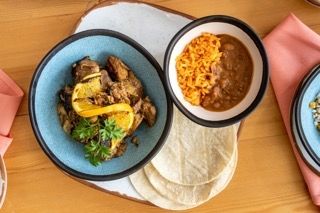Enjoy perfectly balanced hand crafted margarita creations that transform your dining experience
Wiki Article
Is Mexican Food Healthy? Unloading the Nutritional Conveniences of Typical Components
The inquiry of whether Mexican food is healthy invites an exploration of its standard ingredients. Beans and corn act as fundamental staples, abundant in healthy protein and fiber. Avocados provide useful fats, while numerous herbs and flavors include flavor and health advantages - mexican food. With each other, these components create a tapestry of nutrition. Nevertheless, the healthiness of Mexican food typically depends upon preparation techniques and portion dimensions. What function do these variables play in identifying its overall nutritional value?The Power of Beans: Protein and Fiber-Rich Staples
Typically ignored, beans serve as a cornerstone of Mexican food, using a riches of nutritional benefits. Rich in healthy protein, they are an exceptional plant-based option for those seeking to meet their dietary protein requires. This high healthy protein material supports muscular tissue repair service and growth, making beans invaluable for both vegetarians and meat-eaters alike. Additionally, beans are a remarkable resource of nutritional fiber, which aids in food digestion and promotes a sensation of volume, potentially assisting with weight monitoring.The range of beans used in Mexican recipes, such as black beans, pinto beans, and kidney beans, adds to a varied flavor profile and can enhance meals nutritionally. Beans are low in fat and have necessary vitamins and minerals, including folate, magnesium, and iron. With each other, these qualities make beans a vital component, supplying both nutrients and sustenance in conventional Mexican fare.

Corn: a Versatile Grain With Nutritional Advantages
Corn sticks out as a flexible grain basic to Mexican cuisine, celebrated not just for its cooking applications however likewise for its impressive nutritional profile. As a primary ingredient in dishes like tortillas, tamales, and pozole, corn offers vital nutrients that add to a well balanced diet. Rich in carbs, it serves as a considerable power source, while additionally being reduced in fat, making it a favorable option for various dietary needs.Additionally, corn is a great source of dietary fiber, which aids in digestion and advertises satiation. It includes significant quantities of vitamins such as B-complex vitamins, which are essential for power metabolic rate. The existence of anti-oxidants, especially carotenoids, contributes to total wellness by lowering oxidative anxiety. Furthermore, corn is gluten-free, catering to those with gluten sensitivities. On the whole, the dietary advantages of corn emphasize its value in conventional Mexican food and its role in a healthy and balanced diet plan.
Avocados: Healthy And Balanced Fats and Nutrients in Every Bite
Avocados play a significant function in Mexican food, matching meals with their creamy structure and rich taste. Beyond their cooking charm, avocados are commemorated for their impressive dietary profile. They are a rich source of healthy monounsaturated fats, which can aid lower negative cholesterol degrees and support heart health. Additionally, avocados are loaded with important minerals and vitamins, consisting of potassium, vitamin E, and B vitamins, adding to general wellness.The high fiber material in avocados help digestion and advertises satiation, making them a useful addition to any meal. Their special nutrient structure can likewise sustain skin wellness and give anti-inflammatory advantages. Including avocados into conventional Mexican recipes or enjoying them as a New York Times rated standalone treat can improve both flavor and nourishment, demonstrating why they are a precious staple in Mexican cuisine. On the whole, avocados provide a scrumptious way to take pleasure in healthy fats and critical nutrients in every bite.

Spices and Herbs: Flavorful Wellness Boosters
While appreciating the abundant tastes of Mexican food, one can not forget the essential duty that spices and natural herbs play in boosting both preference and wellness. Active ingredients such as chili, oregano, and cilantro peppers not just add to the lively taste profile but also provide significant wellness advantages. As an example, cilantro is understood for its cleansing homes, assisting to eliminate hefty steels from the body, while oregano is packed with antioxidants and possesses anti-inflammatory effects.Chili peppers, a staple in lots of Mexican meals, include capsaicin, which has been linked to enhanced metabolic process and discomfort alleviation. Furthermore, seasonings like cumin and coriander assistance food digestion and might assist in blood sugar level guideline. Including these delicious health boosters into dishes not just improves the cooking experience yet also advertises total well-being, making Mexican cuisine not just scrumptious, yet also nutritionally useful.
Traditional Cooking Methods: Enhancing Nourishment and Taste
Typical food preparation approaches in Mexican cuisine play an important function in boosting both nourishment and taste, as they usually prioritize classic methods and fresh components. Techniques such as nixtamalization, where corn is saturated and cooked in an alkaline option, not only boost the nutrient account of tortillas but likewise boost their digestibility - hand crafted margarita. Furthermore, the usage of slow cooking approaches, like stewing or braising, allows tastes to blend magnificently while preserving the stability of the components
Regularly Asked Inquiries
Are Mexican Food Portions Generally Larger Than Other Foods?
Mexican food parts are often bigger than those of many various other foods. This characteristic reflects conventional eating practices, emphasizing public sharing and hearty dishes, which can result in a more significant offering dimension in general.
Exactly how Does the Prep Work Method Affect Healthfulness of Mexican Food?
Preparation techniques greatly affect the healthiness of Mexican food. Techniques such as barbecuing or steaming maintain nutrients, while frying can enhance undesirable fat content. Options of active ingredients and cooking designs ultimately establish total dietary value.Can Mexican Food Be Customized for Details Dietary Limitations?
Mexican food can indeed be customized for certain dietary constraints. Alternatives, such as utilizing corn tortillas for gluten-free diets or incorporating even more vegetables, allow people to delight in standard flavors while fitting various nutritional requirements.What Prevail False Impressions Concerning Mexican Food and Health And Wellness?
Typical misunderstandings about Mexican food consist of the belief that it is naturally undesirable, excessively zesty, and solely concentrated on fats. In truth, conventional dishes frequently include healthy active ingredients and can be tailored to various nutritional demands.Exist Healthier Options at Mexican Restaurants?
Much healthier choices at Mexican restaurants commonly consist of smoked meats, beans, and fresh veggies. Selecting dishes that stress whole ingredients and preventing hefty sauces can lead to a much more healthy dining experience, promoting overall well-being.The range of beans utilized in Mexican dishes, such as black beans, pinto beans, and kidney beans, adds to a varied flavor account and can enhance dishes nutritionally. Avocados play a considerable function in Mexican cuisine, complementing meals with their creamy appearance and rich taste. Including avocados right into typical Mexican recipes or appreciating them as a standalone snack can improve both taste and nutrition, showing why they are a cherished staple in Mexican food. While appreciating the abundant flavors of Mexican cuisine, one can not neglect the essential role that spices and natural herbs play in enhancing both preference and health. Typical food preparation methods in Mexican food play a necessary role in improving both nutrition and taste, as they frequently focus on fresh active ingredients and classic methods.
Report this wiki page